Welcome back to Music Is The Answer, a fortnightly newsletter created by me, Marcus Barnes.
It’s been a month since the first newsletter, for obvious reasons. Things went a little crazy around the time I posted my first edition and it just didn’t make any sense whatsoever putting out a newsletter in the middle of all the protesting etc… Like many people around the world, I found it really intense and needed time to process, too.
I’m glad people are, finally, waking up to the adversity Black people face every single day and I sincerely hope that all the posts and participation I’ve seen so far are the genesis of conscious change and progression and not just performative allyship. A little bit of virtue signalling gets us nowhere, what’s needed is deep introspection, reading research, speaking to members of the Black community and trying to get a proper understanding of what they’ve been shouting about for generations. A lot of people must face up to the fact that most of us are governed by a system that is unfair. Real, sustained change comes through consciously adjusting your perspective and your behaviour, not posting a black square on social media. Sentiments mean nothing if there is no progressive action taken to undo the systemic oppression on every level, micro to macro.
I’ve done a bit of work in this area already to try and shed some light on the disparity in electronic music, and there is more on the way. Being mixed-race and from a lower class background, I will always do my bit to ensure that there is proper representation in my work. Representation must cover the wider musical field, too. There are so many localised raves and movements that get overlooked because journalists are too focused on a certain level of ‘the scene’.
This was what came up in a conversation I had recently, “Something that must be avoided is the hiring of BAME staff that share exactly the same viewpoints and touchstones on the scene as their white counterparts, or replacements, and calling it job done. It's important that new hires come from communities with a very different perspective and outlook. If they can't name one track from Call Super’s catalogue that's a good thing.”
But it doesn’t stop at coverage for artists, or commissioning/hiring a more diverse spread of writers, there needs to be representation at all levels of the workforce at music organisations - all the way up to the top. This is where I think there is a lot of work to be done.
I know of several Black-owned electronic music businesses and media collectives that are either in the process of being set up, or have already been launched. Perhaps that’s where it starts, someone said to me something along the lines of, “Why should you spend your life asking for a place at the table when you can just build your own?”
Earlier this year I wrote about Motherland, the London-based afrohouse collective. There’s been an afrohouse scene in London for 10 years, yet they’ve had hardly any coverage. 10 years… Like a lot of events that have a largely Black clientele they had issues finding venues to host their parties, which is so common it’s pretty much a cliché. They weren’t plugged into the ‘electronic music network’ and they didn’t really know how to tap into the industry. It’s easy to scoff at that last comment when you’re deeply involved in this business but not everyone out there spends their weekends in fabric’s green room, or backstage at a festival or wherever. This dance music bubble is not always as accessible as we like to think it is.
This quote stands out for me:
Questions are raised about the lack of diversity in the businesses that influence the dance music industry: PR, journalism, booking agencies, management companies and so on. There is a lack of ethnic representation across the board. London may be one of the most ethnically diverse cities in the world, but that doesn’t mean there isn’t still a lot of work to be done. “I’ve never really mentioned it because I don’t want to be seen as pulling the race card, but, deep down I think that’s probably part of it,” D-Malice says. “Seth Troxler started Tuskegee to support ethnic artists, which says a lot I think.”
Have a read of the piece to get some insight and put their mix on while you’re reading, it’s a vibe.
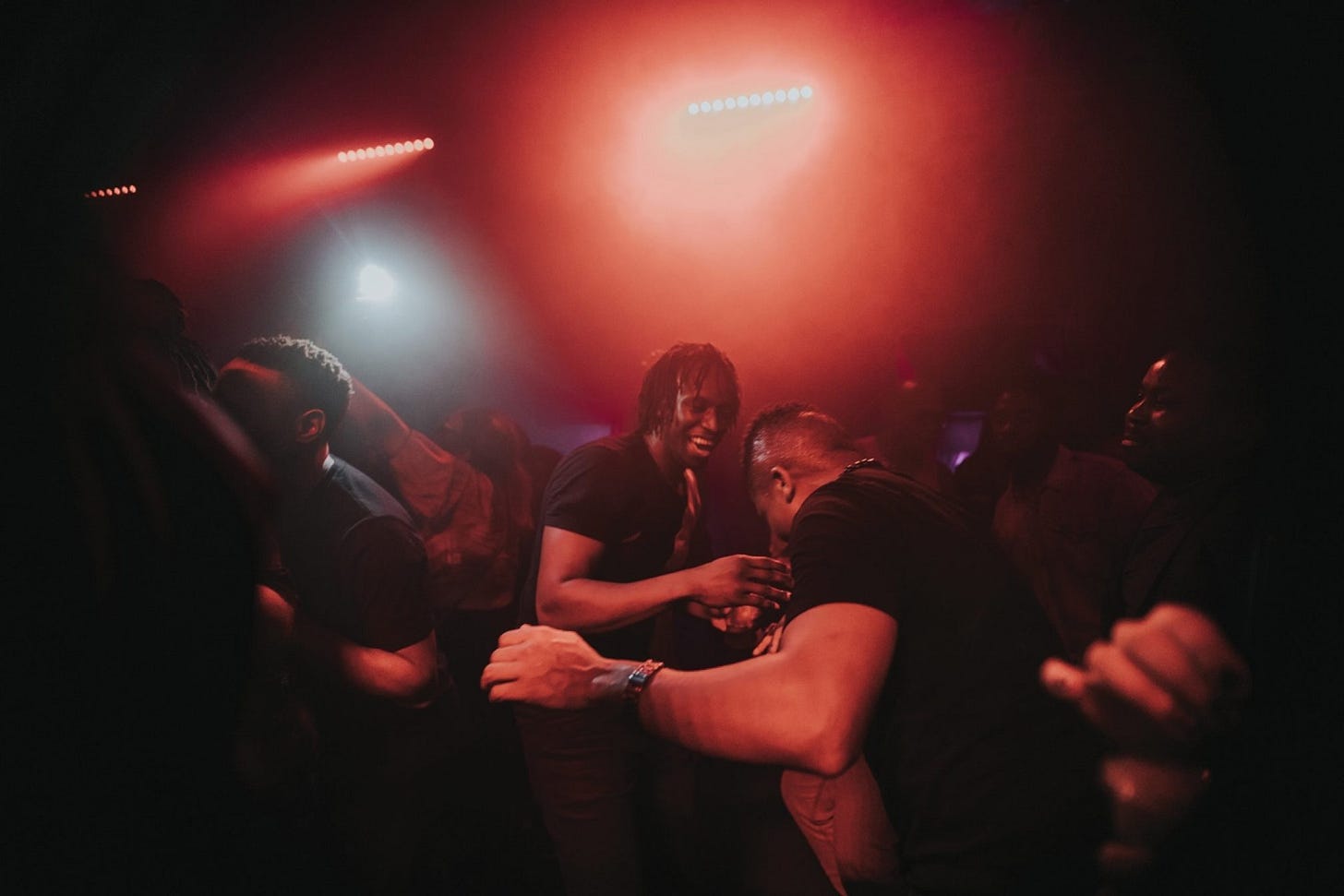
Copyright: © Photography by Aneta Pruszynska (www.anetapruszynska.com)
Ibiza and Writer’s Self-Torment
A couple of weeks ago The Guardian’s Music team, Ben Beaumont-Thomas and Laura Snapes, put together a pitching guide for anyone thinking about sending them ideas. I’m extremely proud to say that a piece I wrote was included in the guide as an example of ‘Strong Reporting’. This is not me taking an opportunity to gloat or boast, it’s actually a chance for me to open up about the utter torment writers like myself can go through when confronted with the sometimes overwhelming process of creating a piece.
When I saw my piece featured in their pitching guide it was a massive ego boost but, more importantly, an acknowledgement that I really, really needed.
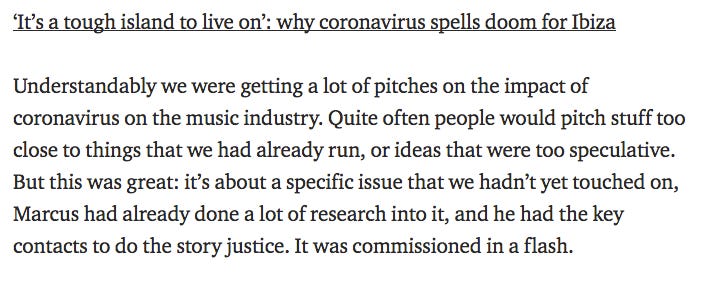
The idea for this piece came from my partner, she suggested it after I mentioned the fact that Ibiza probably wouldn’t be happening this year. So off I went and pitched it in to The Guardian and it was commissioned right away, result!
I’ve done a few bits for The Observer and The Guardian before, but never for Ben Beaumont-Thomas, though we did have a (rather frustrating) back and forth a couple of years ago, when there was a chance I might go and investigate an emergent scene in Nigeria. Sadly, the artist’s management placed a whole a load of unrealistic demands on myself and The Guardian and we reached stalemate.
In light of this I was already slightly nervous, not wanting to “let Ben down again”. I’m sure he didn’t feel let down by the Nigeria thing but this what my wonderful imagination conjured up. In my head I’d been blacklisted and I was now doubly keen to prove myself. Intimidated, but motivated, I cracked on with it putting word out to a big group of industry connections who are all connected to Ibiza in one way or another, plus some contacts who live and work there.
The response was positive and I set about arranging a slew of interviews. Some were around 10 minutes, others went on for up to half an hour. In the midst of doing this I was also interviewing people for a piece commissioned by Ibiza Rocks magazine on pool parties, and I’d also been given a lengthy copywriting test to do for a job I applied for at Native Instruments.
My home life was intense; our baby daughter rarely slept through the night and we’d endured about 10 months of disturbed sleep. Juggling childcare with full-time work was tough, to put it lightly. I was beyond knackered, my brain totally sapped of energy. I was running on virtually nothing, hence the negative thought patterns that were emerging and sending me into a pit of despair. I was supposed to have taken a month off in April but the Coronavirus outbreak put paid to that. Instead of taking the month off I was working as hard as ever, uncertainty about work/electronic music/our future (the little things!) whipped me up into a pitching and job hunting frenzy.

Ibiza sunsets…
The piece was due on a Friday, I started transcribing quotes from the multitude of interviews I’d done around Tuesday, parallel to writing the pool party piece for Ibiza Rocks and gearing myself up for the Native Instruments test - which involved reading all the product copy on their website. I spent aaaages researching Ibiza; employment stats, tourism economics, Coronavirus cases, what was happening at the hospital, what the clubs were saying on social media, food banks, local charities - Google translating stories from local papers in Ibiza and the Balearics, checking Ibiza Spotlight’s forum, where a very useful thread on the Coronavirus impact was being updated daily. Also what was happening on the mainland, how were the Spanish Government’s decisions impacting Ibiza… ? Things were shifting and evolving rapidly, which also fed into my concerns about the piece. I wanted it to be accurate, which was difficult when everything was moving so fast.
Another major area of concern was writing something that could be seen to be negative about Ibiza. I love the place. It’s had such a massive impact on my life. I didn’t want to be the one sounding the death knell for the island and I didn’t want anyone there to feel as though I was writing it off. The facts spoke for themselves: it would be impossible for a normal Ibiza season to happen and, even if it did, how would it work with all the potential restrictions that would be put in place? Sometimes a reporter has to present information that isn’t going to be palatable for those affected by their article. It’s part of the job.
By Thursday I had about 5,000 words that were almost entirely made up of quotes from the interviews I’d done and some of the data I’d gathered. My word limit was 1,500. I never usually do this, in fact I can’t remember the last time I did it, but I stayed up all night trying to knock the piece into shape for the Friday morning deadline. I mean, this all-nighter lasted beyond 5am, when I finally called it quits and sloped into bed, frazzled beyond belief. During that all-night session I kept on listening to the interviews over and over to see if there were any better quotes than the ones I had. Repeatedly sifting through the article itself trying to cut it down but keep as much info in there as I could, not wanting to leave myself open to criticism; “You didn’t mention this! You didn’t mention that!”. 1,500 words isn’t a whole lot to delve into something as complex as the effect of Coronavirus on Ibiza’s economy but I did the very best I could within that limit. Trying to include as many voices as I could, with a plethora of information and data.
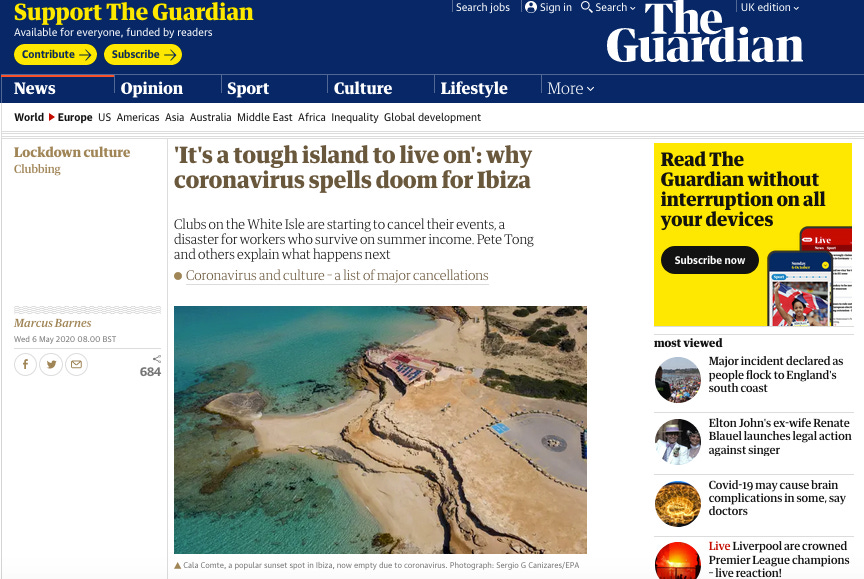
My self-esteem was reeeaaalllyyy low and my self critic was berating me through a megaphone. I kept second guessing myself, convinced the piece was a pile of shit and that I would get admonished by Ben for turning in such an awful piece. Nothing about the article felt good. I agonised over every word, every sentence and every paragraph. I felt like I had so many people to please. I didn’t want anyone to be disappointed.
I woke up a few hours after I went to bed, still exhausted, and went to my laptop to give the piece one last eyeball before I sent it to Ben. I still wasn’t happy with it and it was still over the word count by about 400 words, but the deadline was here. I didn’t know what more I could do, I had nothing left in me, so I sent it and closed my laptop immediately wanting to hide away from what I imagined would be a unpleasant reply.
I waited and checked a few hours later… no response. Monday came… no response. By Tuesday I was really starting to fret. Even my other half was asking me if I’d heard anything. So I went back to the email thread… Somehow the mail was still in draft! I hadn’t even sent it. FUCK.
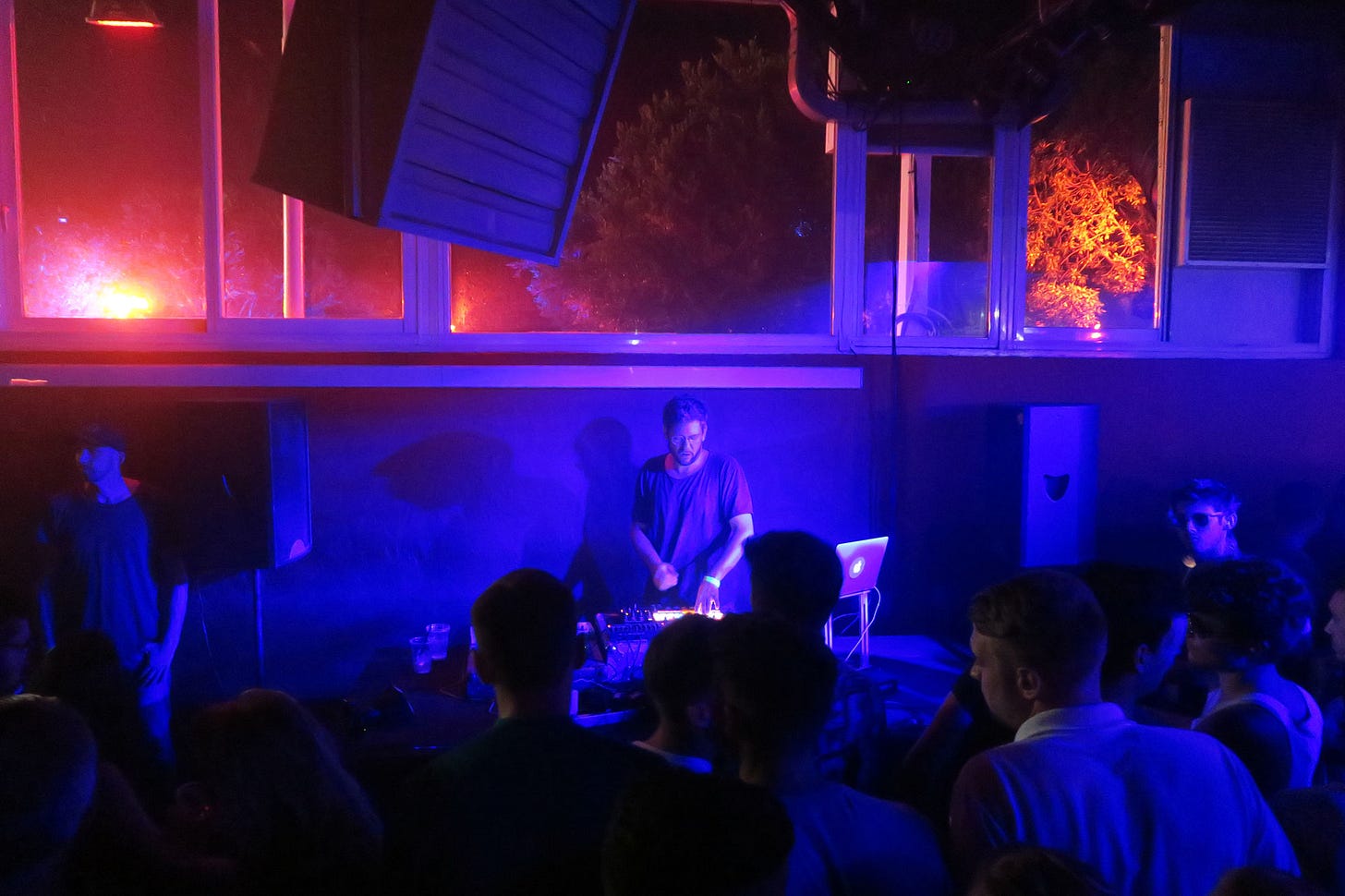
Frank Wiedemann at DC-10
I don’t even know what happened, but I wrote Ben a quick note to explain and sent it over right away. He replied, all was fine, he’d been busy anyway plus the delay meant I could update the article with the latest news - Spain had announced their Four-Step plan to the “nueva normalidad” that week.
In the end he sent back an edit that was a tighter version of what I’d done with a few questions here and there but largely untouched. I couldn’t believe it.
I got the questions sorted, added a nice quote to wrap it up and we were done.
The response was 99.9% positive with only a couple of criticisms. But guess what? The two tiny little bits of negative feedback I read sent me into a total spin, confirming and amplifying all the self-criticism I’d been heaping on myself throughout the writing process. URGH.
It’s not always like this. But I needed to share an example of how bad it can get for us writers sometimes. What people don’t see, and don’t even think about, is the process. You see a piece of writing and take it as it is. It doesn’t usually have a face, you can’t identify with the human who wrote it. Typically, the way people view journalists also taints their view of journalism itself. I said on Twitter afterwards, “I think a lot of readers imagine journalists arrogantly botch together their pieces, sneering as they compile lies and disinformation under sensationalist headlines... Journalists aren't some one-dimensional malevolent presence out to blindside the world into believing made up stories (well, not all of us anyway).”
I’m not complaining. I love my job. However, given my domestic situation, which has been troubling me for the past year, and the way people view journalists, I thought it was important to share my experience here. I want readers to get a bit of insight into how painful the creative process can sometimes be, in the hope that it might make you think twice next time you poo-poo an article (unless it’s clearly utter trash).
What have I learned from this? Well, given the extenuating circumstances, a quick message to the people I was working for could have probably allowed me a couple more days to get the piece (and my other bits of work) done. It’s been a tough time for everyone over the last few months, trying to survive in the midst of a huge shift in everyday life. Being open about the difficulties we’re facing is probably one of the best things you can do for your mental health, bottling it all up and attempting to ‘carry as normal’ (when there is literally no normal anymore) just won’t cut it. Trying not to take on too much work, even though there’s so much uncertainty probably could have helped as well.
Anyone reading this who needs to vent, feel free to drop me a line.
Indie Blog Archive 002: Mr. G
Mr. G really brings that Black energy and heritage to electronic music. His Jamaican background, his love of soul, RnB, hip hop, funk, reggae, his penchant for soundsystems and BASS, the way he dances so expressively… it’s all there in his music.
I remember sitting at my desk in my sister’s old room at my mum’s, where I was living and working at the time, chatting to Mr. G about his father (who’d passed away), and his time in Jamaica around the time of the funeral. I always find that my interviews take me right back to where I was at the time. This is a deep one.
Techno Reviews: June 2020
There’s still a couple of months left until Mixmag’s print edition returns, so I’m continuing to post my reviews here instead. Also included is my monthly mix, plus links to buy all of the releases.
Read the reviews and listen to my mix.
Mixes I’ve Enjoyed Recently
I did the Soundcloud algorithm thing again recently, but also grabbed a few mixes from elsewhere. I’ve been following Mr G’s ‘Safe Place’ mixes avidly, likewise D’Julz and his Home Diggin’ sets are as classy as you’d expect from the Frenchman.
Man Like Morgan - August 2018 - Balaami - This is probably my most played mix of the last couple of years. Full of house/garage classics, takes me back to the days when pirate radio dominated my listening habits.
Some Reading
Over the past year or so I’ve been using Pocket and Medium a hell of a lot, reading tons and tons of articles. I’ve always been an avid reader and every newsletter I’ll share some of the many articles and/or books I’ve enjoyed.
Chills and thrills: why some people love music – and others don’t
"Down The Rabbit Hole I Go": How A Young Woman Followed Two Hackers' Lies To Her Death
A Shaolin kung fu master shares the 5 mental states that hold us back in life—and how to fight them
33 1/3: Jay Dilla’s Donuts - Excellent book, only took me a few days as it’s pretty short. Packs a lot of information in but never feels dense.
Something To Watch
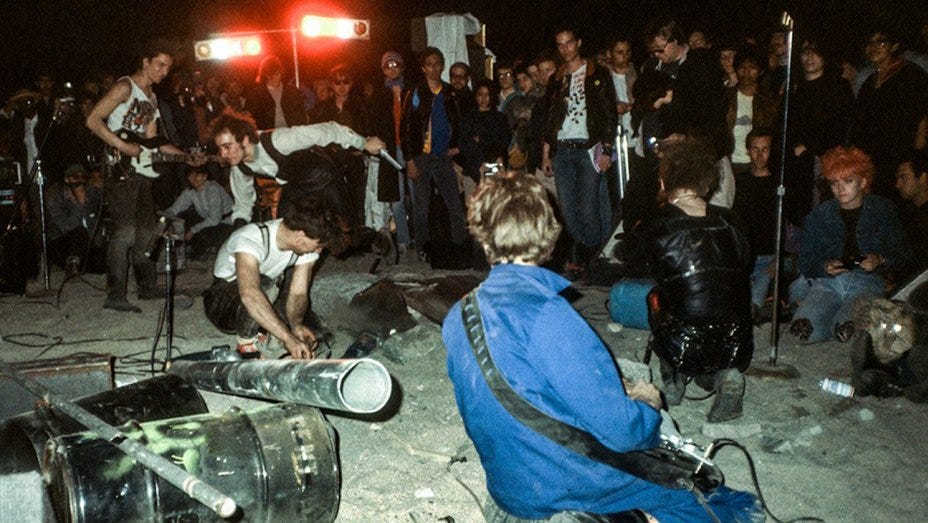
I received a preview link for a documentary called Desolation Center a couple of weeks ago. I watched it last weekend and it was a fantastic insight into a pivotal movement that occured in LA in the eighties, when a group of music lovers decided to take some bands out to the desert and have a party.
These were the very first series of desert-based concerts that took place in the States, inspiring festivals such as Burning Man, Lollapolooza and Coachella… They were far more DIY, raw and experimental, with a few hundred LA party kids taken out to secret locations on school buses. There’s some great vintage footage from the concerts, with Sonic Youth, Minutemen, Meat Puppets and more, plus Einstürzende Neubauten and Survival Research Laboratories pulling off some absolutely insane performances.
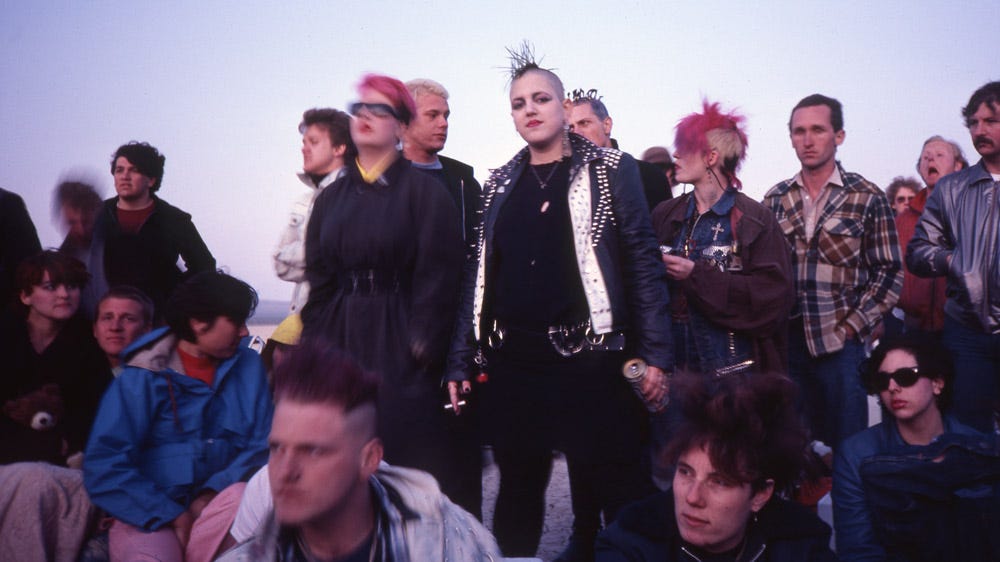
The film had me smiling throughout, all the interviews and talking heads are excellent. The filmmakers managed to track down most of the performers, and a few of the attendees as well, and goes without saying that the music is top notch. Eighties LA had a wild grassroots music scene which the authorities, of course, tried to quash constantly, hence the promoters putting on events off-grid.
It’s films like this that inspire to keep on doing what I do. Absolutely loved it.
That’s all for now…
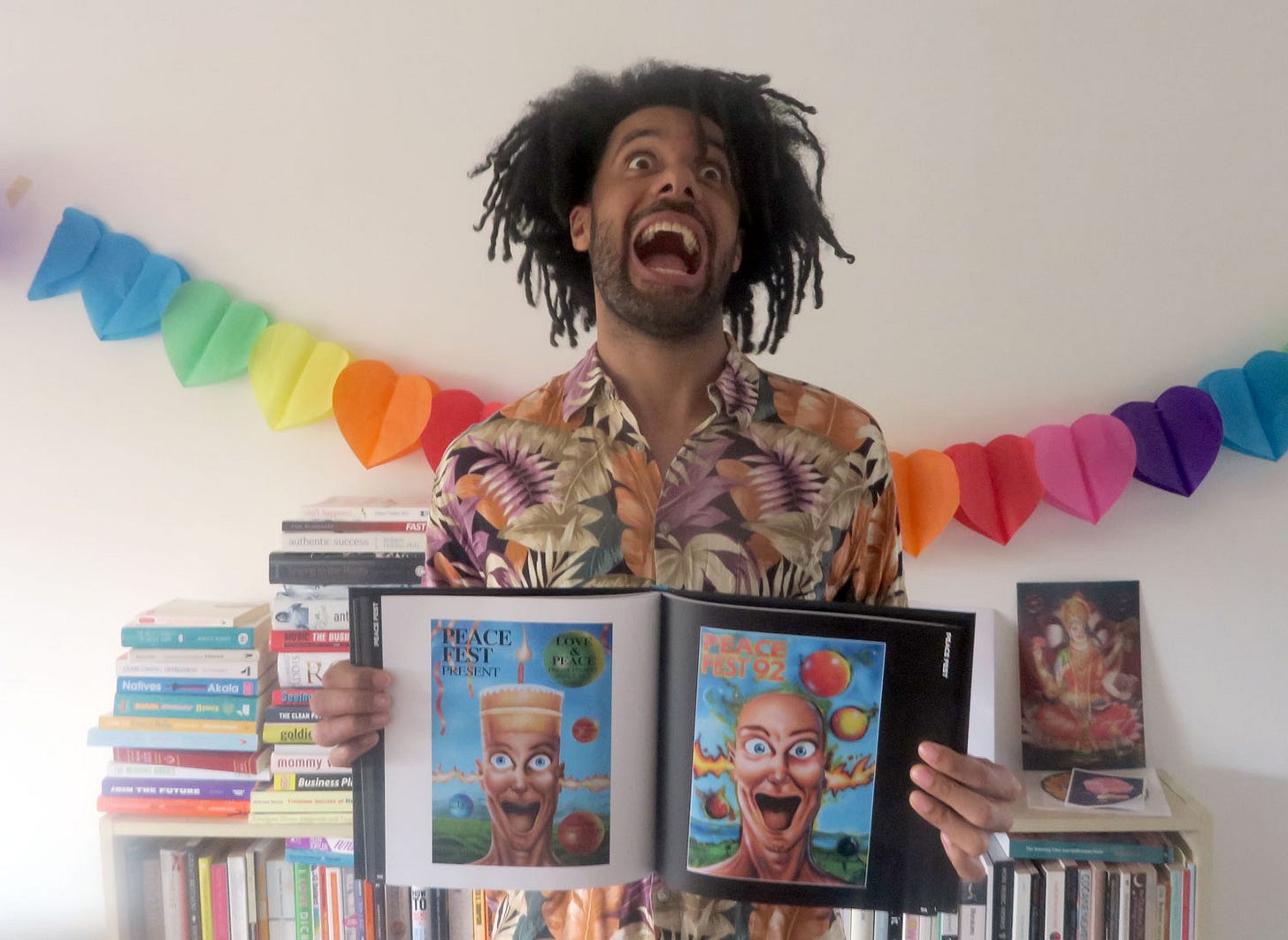
Here’s a snap of me buzzing over my copy of Junior Tomlin: Flyer & Cover Art - a book that I made a significant contribution to. Out now!
Feel free to sign up so you don’t miss future issues.
In the meantime, tell your friends!
